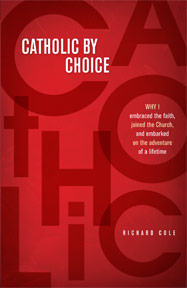That’s the elephant-in-the-room question. Huge. Invisible. Usually ignored but too big to be ushered out the door.
As for me, I have three answers to this question.
First, something happened to me at the middle of my life that I can’t explain except in divine terms. I was an unbeliever, but I went to a monastery, found God and joined the Catholic church. I can’t reduce that change to some psychological flip-flop or a mid-life crisis or whatever. It was a radical change unlike anything I’d experienced, and I’d experienced more than a few changes in my life by that point.
Second, the world is more than higgledy-piggledy, to use a term from debates between believers and non-believers. I think I understand the value of that term. In nature, we see complex and organically ordered patterns that seem to emerge from purely random forces, like a river delta that resembles fractal-generated patterns. But to say that we and the universe are just clusters of molecules bundled together higgledy-piggledy seems a stretch. I believe in evolution. I think of evolution as how God thinks. But in strictly evolutionary terms, we’re wildly over-engineered for mere survival. Higgledy-piggledy can’t explain a Mozart, an Einstein, you, me or a new-born infant. The world is far, far more than it has to be.
Third, lots of other people believe in God, millions and billions of people down through the centuries. This is called the argument by consensus. For me, it’s the strongest argument, even as for certain non-believers it’s the weakest. I don’t think people are stupid. We’re all intellectuals, more or less. Sure, some of us have knacks and talents. A mathematical knack, an intuitive talent. Some of us read more books than others. But I’ve spent too much time sitting in a circle in a church basement somewhere listening to others not to understand that when it comes to the really big questions — Where did we come from? Who are we? Where are we going? — all human beings are pretty much on a level playing field. Millions and billions of us, trying to puzzle things out.
I think of human history, including the history of religion, faith and doubt, as a kind of parallel processing, a vast population of servers added down through time that are all working on the same problem. The sheer size of this server farm can’t be ignored. Yes, we have all collectively come up with an almost infinite number of wrong answers, but I also think we have a collective intelligence greater than any individual insight.
So that’s what I think about the Big Question. Does it care? It puts another trunkful of hay in its mouth, steadily chewing as it looks at me with those ancient elephant eyes. It still doesn’t leave the room. Maybe it’s waiting for better answers. What do you think?

